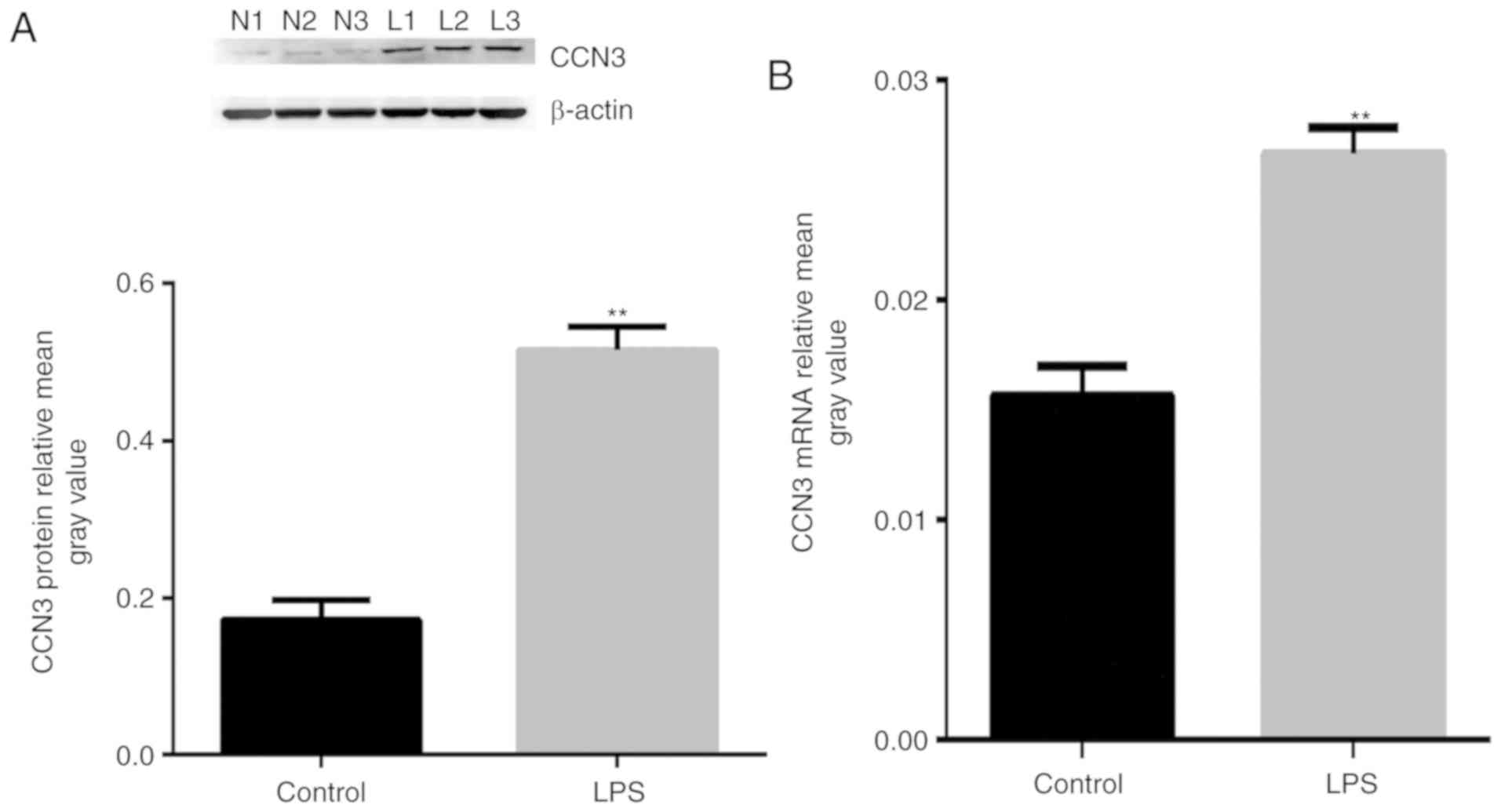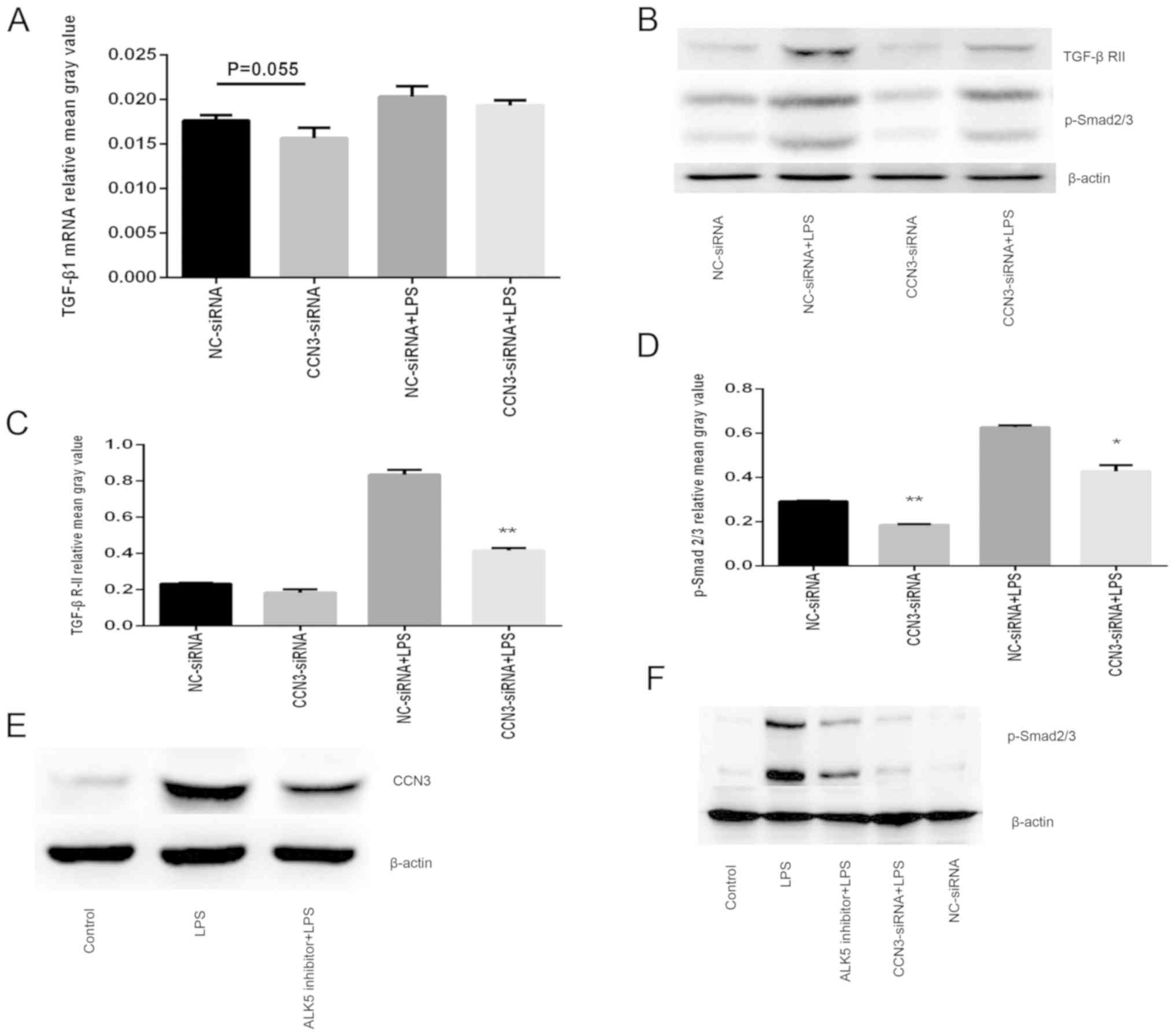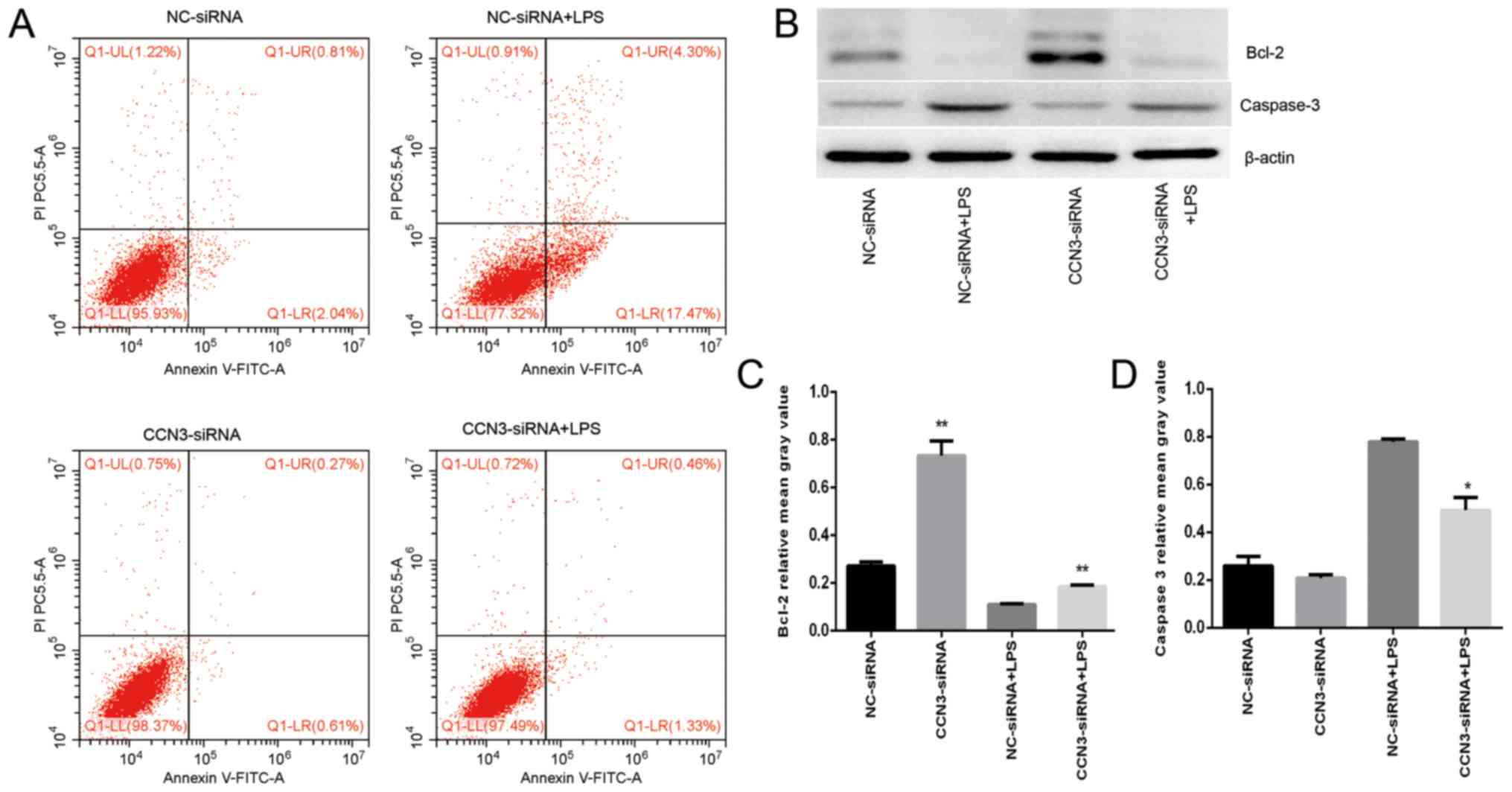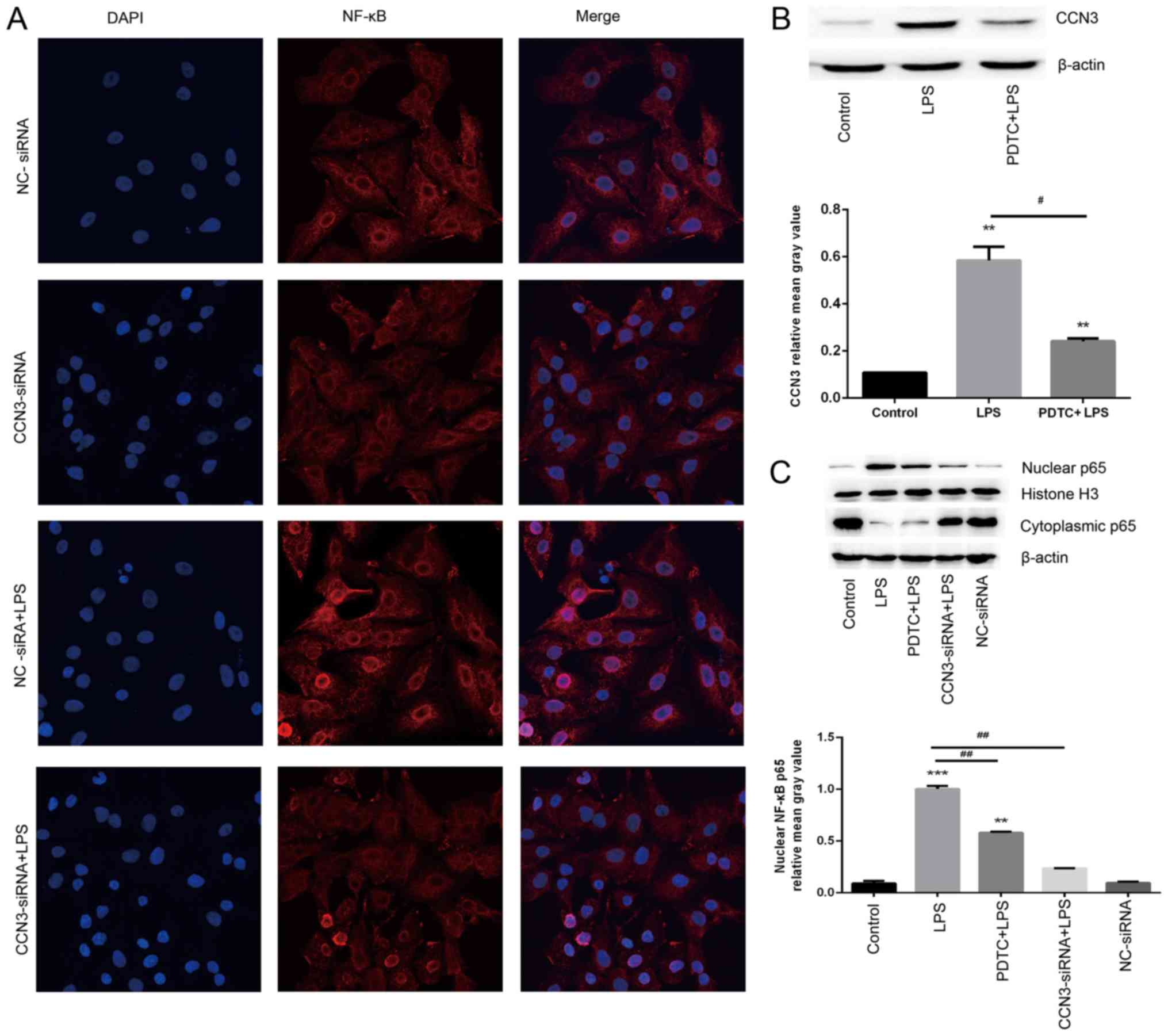|
1
|
Matthay MA, Ware LB and Zimmerman GA: The
acute respiratory distress syndrome. J Clin Invest. 122:2731–2740.
2012. View
Article : Google Scholar : PubMed/NCBI
|
|
2
|
Ware LB and Matthay MA: The acute
respiratory distress syndrome. N Engl J Med. 342:1334–1349. 2000.
View Article : Google Scholar : PubMed/NCBI
|
|
3
|
Rooney SA: Regulation of surfactant
secretion. Comp Biochem Physiol A Mol Integr Physiol. 129:233–243.
2001. View Article : Google Scholar : PubMed/NCBI
|
|
4
|
Galani V, Tatsaki E, Bai M, Kitsoulis P,
Lekka M, Nakos G and Kanavaros P: The role of apoptosis in the
pathophysiology of Acute Respiratory Distress Syndrome (ARDS): An
up-to-date cell-specific review. Pathol Res Pract. 206:145–150.
2010. View Article : Google Scholar : PubMed/NCBI
|
|
5
|
Imazu Y, Yanagi S, Miyoshi K, Tsubouchi H,
Yamashita SI, Matsumoto N, Ashitani JI, Kangawa K and Nakazato M:
Ghrelin ameliorates bleomycin-induced acute lung injury by
protecting alveolar epithelial cells and suppressing lung
inflammation. Eur J Pharmacol. 672:153–158. 2011. View Article : Google Scholar : PubMed/NCBI
|
|
6
|
Kutsukake M, Matsutani T, Tamura K,
Matsuda A, Kobayashi M, Tachikawa E and Uchida E: Pioglitazone
attenuates lung injury by modulating adipose inflammation. J Surg
Res. 189:295–303. 2014. View Article : Google Scholar : PubMed/NCBI
|
|
7
|
Kular L, Pakradouni J, Kitabgi P, Laurent
M and Martinerie C: The CCN family: A new class of inflammation
modulators. Biochimie. 93:377–388. 2011. View Article : Google Scholar : PubMed/NCBI
|
|
8
|
Perbal B: NOV (nephroblastoma
overexpressed) and the CCN family of genes: Structural and
functional issues. Mol Pathol. 54:57–79. 2001. View Article : Google Scholar : PubMed/NCBI
|
|
9
|
Lin Z, Natesan V, Shi H, Hamik A, Kawanami
D, Hao C, Mahabaleshwar GH, Wang W, Jin ZG, Atkins GB, et al: A
novel role of CCN3 in regulating endothelial inflammation. J Cell
Commun Signal. 4:141–153. 2010. View Article : Google Scholar : PubMed/NCBI
|
|
10
|
Wu W, Hu X, Zhou X, Klenotic PA, Zhou Q
and Lin Z: Myeloid deficiency of CCN3 exacerbates liver injury in a
mouse model of nonalcoholic fatty liver disease. J Cell Commun
Signal. 12:389–399. 2018. View Article : Google Scholar : PubMed/NCBI
|
|
11
|
Chen PP, Li WJ, Wang Y, Zhao S, Li DY,
Feng LY, Shi XL, Koeffler HP, Tong XJ and Xie D: Expression of
Cyr61, CTGF, and WISP-1 correlates with clinical features of lung
cancer. PLoS One. 2:e5342007. View Article : Google Scholar : PubMed/NCBI
|
|
12
|
Dolinay T, Kaminski N, Felgendreher M, Kim
HP, Reynolds P, Watkins SC, Karp D, Uhlig S and Choi AM: Gene
expression profiling of target genes in ventilator-induced lung
injury. Physiol Genomics. 26:68–75. 2006. View Article : Google Scholar : PubMed/NCBI
|
|
13
|
Llinàs L, Peinado VI, Ramon Goñi J,
Rabinovich R, Pizarro S, Rodriguez-Roisin R, Barberà JA and Bastos
R: Similar gene expression profiles in smokers and patients with
moderate COPD. Pulm Pharmacol Ther. 24:32–41. 2011. View Article : Google Scholar : PubMed/NCBI
|
|
14
|
Moon HG, Kim SH, Gao J, Quan T, Qin Z,
Osorio JC, Rosas IO, Wu M, Tesfaigzi Y and Jin Y: CCN1 secretion
and cleavage regulate the lung epithelial cell functions after
cigarette smoke. Am J Physiol Lung Cell Mol Physiol. 307:L326–L337.
2014. View Article : Google Scholar : PubMed/NCBI
|
|
15
|
Shahzeidi S, Mulier BD, de Crombrugghe B,
Jeffery PK, McAnulty RJ and Laurent GJ: Enhanced type III collagen
gene expression during bleomycin induced lung fibrosis. Thorax.
48:622–628. 1993. View Article : Google Scholar : PubMed/NCBI
|
|
16
|
Chen C, Shi L, Li Y, Wang X and Yang S:
Disease-specific dynamic biomarkers selected by integrating
inflammatory mediators with clinical informatics in ARDS patients
with severe pneumonia. Cell Biol Toxicol. 32:169–184. 2016.
View Article : Google Scholar : PubMed/NCBI
|
|
17
|
Cui X, Zeni F, Vodovitz Y,
Correa-de-Araujo R, Quezado M, Roberts A, Wahl S, Danner RL, Banks
SM, Gerstenberger E, et al: TGF-beta1 increases microbial clearance
but worsens lung injury during Escherichia coli pneumonia in
rats. Cytokine. 24:115–127. 2003. View Article : Google Scholar : PubMed/NCBI
|
|
18
|
Dhainaut JF, Charpentier J and Chiche JD:
Transforming growth factor-beta: A mediator of cell regulation in
acute respiratory distress syndrome. Crit Care Med. 31 (Suppl
4):S258–S264. 2003. View Article : Google Scholar : PubMed/NCBI
|
|
19
|
Fahy RJ, Lichtenberger F, McKeegan CB,
Nuovo GJ, Marsh CB and Wewers MD: The acute respiratory distress
syndrome: A role for transforming growth factor-beta 1. Am J Respir
Cell Mol Biol. 28:499–503. 2003. View Article : Google Scholar : PubMed/NCBI
|
|
20
|
Lin J, Tian J, Wang L, Wu W, Li H, Wang X,
Zeng X and Zhang W: Apoptosis and surfactant protein-C expression
inhibition induced by lipopolysaccharide in AEC II cell may
associate with NF-κB pathway. J Toxicol Sci. 42:53–61. 2017.
View Article : Google Scholar : PubMed/NCBI
|
|
21
|
Yang KY, Arcaroli JJ and Abraham E: Early
alterations in neutrophil activation are associated with outcome in
acute lung injury. Am J Respir Crit Care Med. 167:1567–1574. 2003.
View Article : Google Scholar : PubMed/NCBI
|
|
22
|
Boots AW, Gerloff K, Bartholomé R, van
Berlo D, Ledermann K, Haenen GR, Bast A, van Schooten FJ, Albrecht
C and Schins RP: Neutrophils augment LPS-mediated pro-inflammatory
signaling in human lung epithelial cells. Biochim Biophys Acta.
1823:1151–1162. 2012. View Article : Google Scholar : PubMed/NCBI
|
|
23
|
Cabrera-Benítez NE, Pérez-Roth E,
Ramos-Nuez Á, Sologuren I, Padrón JM, Slutsky AS and Villar J:
Inhibition of endotoxin-induced airway epithelial cell injury by a
novel family of pyrrol derivates. Lab Invest. 96:632–640. 2016.
View Article : Google Scholar : PubMed/NCBI
|
|
24
|
Chuang CY, Chen TL, Cherng YG, Tai YT,
Chen TG and Chen RM: Lipopolysaccharide induces apoptotic insults
to human alveolar epithelial A549 cells through reactive oxygen
species-mediated activation of an intrinsic mitochondrion-dependent
pathway. Arch Toxicol. 85:209–218. 2011. View Article : Google Scholar : PubMed/NCBI
|
|
25
|
MacRedmond R, Singhera GK and Dorscheid
DR: Erythropoietin inhibits respiratory epithelial cell apoptosis
in a model of acute lung injury. Eur Respir J. 33:1403–1414. 2009.
View Article : Google Scholar : PubMed/NCBI
|
|
26
|
Muroya M, Chang K, Uchida K, Bougaki M and
Yamada Y: Analysis of cytotoxicity induced by proinflammatory
cytokines in the human alveolar epithelial cell line A549. Biosci
Trends. 6:70–80. 2012.PubMed/NCBI
|
|
27
|
Rodríguez-González R, Ramos-Nuez Á,
Martín-Barrasa JL, López-Aguilar J, Baluja A, Álvarez J, Rocco PR,
Pelosi P and Villar J: Endotoxin-induced lung alveolar cell injury
causes brain cell damage. Exp Biol Med (Maywood). 240:135–142.
2015. View Article : Google Scholar : PubMed/NCBI
|
|
28
|
Shao L, Meng D, Yang F, Song H and Tang D:
Irisin-mediated protective effect on LPS-induced acute lung injury
via suppressing inflammation and apoptosis of alveolar epithelial
cells. Biochem Biophys Res Commun. 487:194–200. 2017. View Article : Google Scholar : PubMed/NCBI
|
|
29
|
Fong YC, Maa MC, Tsai FJ, Chen WC, Lin JG,
Jeng LB, Yang RS, Fu WM and Tang CH: Osteoblast-derived TGF-beta1
stimulates IL-8 release through AP-1 and NF-kappaB in human cancer
cells. J Bone Miner Res. 23:961–970. 2008. View Article : Google Scholar : PubMed/NCBI
|
|
30
|
Livak KJ and Schmittgen TD: Analysis of
relative gene expression data using real-time quantitative PCR and
the 2(-Delta Delta C(T)) method. Methods. 25:402–408. 2001.
View Article : Google Scholar : PubMed/NCBI
|
|
31
|
Akbarshahi H, Sam A, Chen C, Rosendahl AH
and Andersson R: Early activation of pulmonary TGF-β1/Smad2
signaling in mice with acute pancreatitis-associated acute lung
injury. Mediators Inflamm. 2014:1480292014. View Article : Google Scholar : PubMed/NCBI
|
|
32
|
Scorrano L and Korsmeyer SJ: Mechanisms of
cytochrome c release by proapoptotic BCL-2 family members. Biochem
Biophys Res Commun. 304:437–444. 2003. View Article : Google Scholar : PubMed/NCBI
|
|
33
|
Lin WC, Chen CW, Huang YW, Chao L, Chao J,
Lin YS and Lin CF: Kallistatin protects against sepsis-related
acute lung injury via inhibiting inflammation and apoptosis. Sci
Rep. 5:124632015. View Article : Google Scholar : PubMed/NCBI
|
|
34
|
Dolinay T, Kim YS, Howrylak J, Hunninghake
GM, An CH, Fredenburgh L, Massaro AF, Rogers A, Gazourian L,
Nakahira K, et al: Inflammasome-regulated cytokines are critical
mediators of acute lung injury. Am J Respir Crit Care Med.
185:1225–1234. 2012. View Article : Google Scholar : PubMed/NCBI
|
|
35
|
Chen CC and Lau LF: Deadly liaisons: Fatal
attraction between CCN matricellular proteins and the tumor
necrosis factor family of cytokines. J Cell Commun Signal. 4:63–69.
2010. View Article : Google Scholar : PubMed/NCBI
|
|
36
|
Feng T, Yunfeng N, Jinbo Z, Zhipei Z,
Huizhong Z, Li L, Tao J and Yunjie W: Single immunoglobulin IL-1
receptor-related protein attenuates the lipopolysaccharide-induced
inflammatory response in A549 cells. Chem Biol Interact.
183:442–449. 2010. View Article : Google Scholar : PubMed/NCBI
|
|
37
|
Aloisi F, Carè A, Borsellino G, Gallo P,
Rosa S, Bassani A, Cabibbo A, Testa U, Levi G and Peschle C:
Production of hemolymphopoietic cytokine s (IL-6, IL-8,
colony-stimulating factors) by normal human astrocytes in response
to IL-1 beta and tumor necrosis factor-alpha. J Immunol.
149:2358–2366. 1992.PubMed/NCBI
|
|
38
|
Shi L, Dong N, Ji D, Huang X, Ying Z, Wang
X and Chen C: Lipopolysaccharide-induced CCN1 production enhances
interleukin-6 secretion in bronchial epithelial cells. Cell Biol
Toxicol. 34:39–49. 2018. View Article : Google Scholar : PubMed/NCBI
|
|
39
|
Butt Y, Kurdowska A and Allen TC: Acute
lung injury: A clinical and molecular review. Arch Pathol Lab Med.
140:345–350. 2016. View Article : Google Scholar : PubMed/NCBI
|
|
40
|
Hurst V VI, Goldberg PL, Minnear FL,
Heimark RL and Vincent PA: Rearrangement of adherens junctions by
transforming growth factor-beta1: Role of contraction. Am J
Physiol. 276:L582–L595. 1999.PubMed/NCBI
|
|
41
|
Sureshbabu A, Syed MA, Boddupalli CS,
Dhodapkar MV, Homer RJ, Minoo P and Bhandari V: Conditional
overexpression of TGFβ1 promotes pulmonary inflammation, apoptosis
and mortality via TGFβR2 in the developing mouse lung. Respir Res.
16:42015. View Article : Google Scholar : PubMed/NCBI
|
|
42
|
Pittet JF, Griffiths MJ, Geiser T,
Kaminski N, Dalton SL, Huang X, Brown LA, Gotwals PJ, Koteliansky
VE, Matthay MA and Sheppard D: TGF-beta is a critical mediator of
acute lung injury. J Clin Invest. 107:1537–1544. 2001. View Article : Google Scholar : PubMed/NCBI
|
|
43
|
Naruse T, Aoki M, Fujimoto N, Arase S,
Oura H, Ueda Y and Ikeda A: Novel ALK5 inhibitor TP0427736 reduces
TGF-β induced growth inhibition in human outer root sheath cells
and elongates anagen phase in mouse hair follicles. Pharmacol Rep.
69:485–491. 2017. View Article : Google Scholar
|
|
44
|
Bardales RH, Xie SS, Schaefer RF and Hsu
SM: Apoptosis is a major pathway responsible for the resolution of
type II pneumocytes in acute lung injury. Am J Pathol. 149:845–852.
1996.PubMed/NCBI
|
|
45
|
Aggarwal S, Dimitropoulou C, Lu Q, Black
SM and Sharma S: Glutathione supplementation attenuates
lipopolysaccharide-induced mitochondrial dysfunction and apoptosis
in a mouse model of acute lung injury. Front Physiol. 3:1612012.
View Article : Google Scholar : PubMed/NCBI
|
|
46
|
Borner C: The Bcl-2 protein family:
Sensors and checkpoints for life-or-death decisions. Mol Immunol.
39:615–647. 2003. View Article : Google Scholar : PubMed/NCBI
|
|
47
|
Doghman M, Arhatte M, Thibout H, Rodrigues
G, De Moura J, Grosso S, West AN, Laurent M, Mas JC, Bongain A, et
al: Nephroblastoma overexpressed/cysteine-rich protein
61/connective tissue growth factor/nephroblastoma overexpressed
gene-3 (NOV/CCN3), a selective adrenocortical cell proapoptotic
factor, is down-regulated in childhood adrenocortical tumors. J
Clin Endocrinol Metab. 92:3253–3260. 2007. View Article : Google Scholar : PubMed/NCBI
|
|
48
|
Pahl HL: Activators and target genes of
Rel/NF-kappaB transcription factors. Oncogene. 18:6853–6866. 1999.
View Article : Google Scholar : PubMed/NCBI
|
|
49
|
Nighot M, Rawat M, Al-Sadi R, Castillo EF,
Nighot P and Ma TY: Lipopolysaccharide-induced increase in
intestinal permeability is mediated by TAK-1 activation of IKK and
MLCK/MYLK gene. Am J Pathol. 189:797–812. 2019. View Article : Google Scholar : PubMed/NCBI
|
|
50
|
Lopez AD, Avasarala S, Grewal S, Murali AK
and London L: Differential role of the Fas/Fas ligand apoptotic
pathway in inflammation and lung fibrosis associated with reovirus
1/L-induced bronchiolitis obliterans organizing pneumonia and acute
respiratory distress syndrome. J Immunol. 183:8244–8257. 2009.
View Article : Google Scholar : PubMed/NCBI
|
|
51
|
Matsui K, Fine A, Zhu B, Marshak-Rothstein
A and Ju ST: Identification of two NF-kappa B sites in mouse CD95
ligand (Fas ligand) promoter: Functional analysis in T cell
hybridoma. J Immunol. 161:3469–3473. 1998.PubMed/NCBI
|
|
52
|
White MK, Baireddy V and Strayer DS:
Natural protection from apoptosis by surfactant protein A in type
II pneumocytes. Exp Cell Res. 263:183–192. 2001. View Article : Google Scholar : PubMed/NCBI
|
|
53
|
Cheng DS, Han W, Chen SM, Sherrill TP,
Chont M, Park GY, Sheller JR, Polosukhin VV, Christman JW, Yull FE,
et al: Airway epithelium controls lung inflammation and injury
through the NF-kappa B pathway. J Immunol. 178:6504–6513. 2007.
View Article : Google Scholar : PubMed/NCBI
|
|
54
|
Gu LZ, Sun H and Chen JH: Histone
deacetylases 3 deletion restrains PM2.5-induced mice lung injury by
regulating NF-κB and TGF-β/Smad2/3 signaling pathways. Biomed
Pharmacother. 85:756–762. 2017. View Article : Google Scholar : PubMed/NCBI
|
|
55
|
Rosendahl A, Checchin D, Fehniger TE, ten
Dijke P, Heldin CH and Sideras P: Activation of the
TGF-beta/activin-Smad2 pathway during allergic airway inflammation.
Am J Respir Cell Mol Biol. 25:60–68. 2001. View Article : Google Scholar : PubMed/NCBI
|
|
56
|
Sharp C, Millar AB and Medford AR:
Advances in understanding of the pathogenesis of acute respiratory
distress syndrome. Respiration. 89:420–434. 2015. View Article : Google Scholar : PubMed/NCBI
|



















